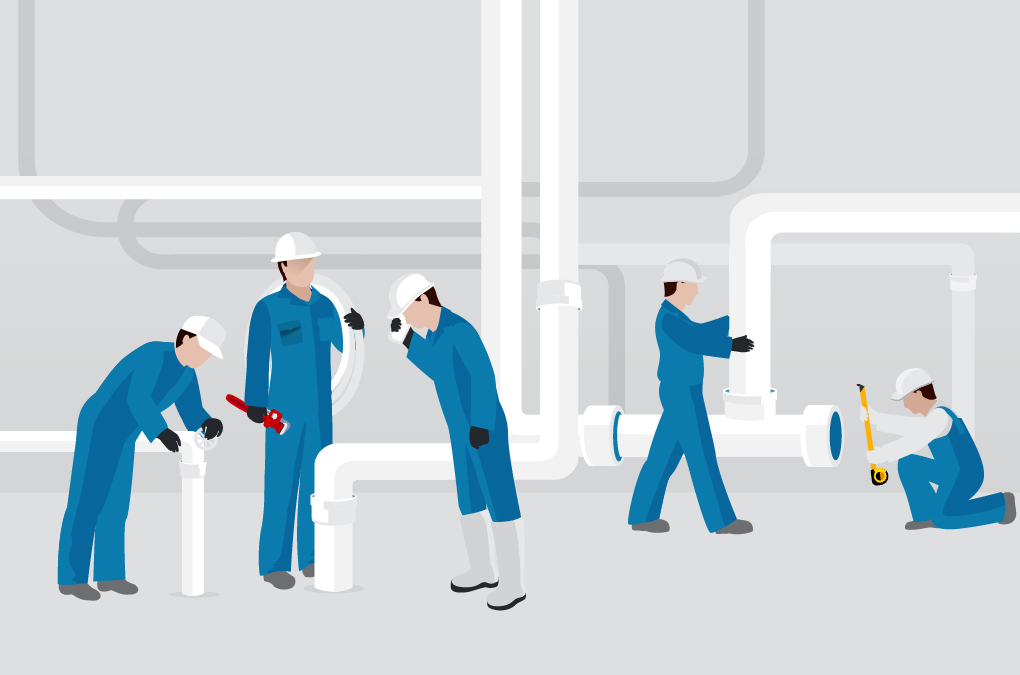
As winter has officially set in, homeowners face a new set of challenges, particularly when it comes to plumbing. The cold weather can wreak havoc on your home’s plumbing system, leading to inconvenient and sometimes costly problems if left unchecked. That’s why we’ve written this quick guide! Understanding what to look out for can make all the difference, so keep reading and don’t let winter plumbing issues catch you by surprise.
1. Frozen Pipes
One of the most dreaded winter plumbing problems is frozen pipes. Pipes freeze when the temperature drops significantly, and water inside them turns to ice, expanding and potentially causing cracks or bursts.
To prevent this, insulate your pipes, especially those in unheated areas, and keep your thermostat set to the same temperature day and night. If pipes do freeze, thaw them gently using a hairdryer, starting from the faucet end to allow melting ice to drip out.
2. Water Heater Failure
All those hot showers during the winter months means your water heater is working overtime, not to mention the extra energy required to heat the extra cold water running into it.
To limit the risk of failures, check the temperature setting (it should be around 120°F for best performance), inspect the unit for leaks, and consider flushing the tank to remove sediment. If your water heater shows signs of wear, such as inconsistent water temperature or strange noises, consult a professional because it may be time to replace. Remember, the last thing you want is a broken water heater in the middle of winter!
3. Clogged Drain Lines
Whether it is from the increase of holiday cooking inside or the buildup of ice/debri outside, drain lines tend to be all the more susceptible to clogs this time of year. Here’s some tips for keeping your drains clear and avoiding unnecessary stoppages:
A) Avoid Dumping Grease Down the Drain: Grease, fats, and oils can solidify within your plumbing, leading to blockages.
B) Use Drain Strainers: Install strainers in sinks, showers, and tubs to catch hair, food particles, and other debris that can lead to clogs. Clean these strainers regularly to ensure they remain effective.
C) Regular Plumbing Inspections: Have a professional plumber inspect your home’s main sewer line and drains periodically to identify potential problems before they occur.
D) Professional Drain Cleaning: If you start to notice slow drains or recurring clogs, it may be time to call in a professional for a thorough drain cleaning. This can help remove buildup that home remedies can’t handle and restore proper flow to your plumbing system.
4. Sump Pump Malfunction
Sump pumps prevent basement flooding, which is especially important during winter when melting snow can increase water levels around your foundation. Ensure your sump pump is clean, the outlet pipes are clear, and consider installing a battery backup in case of a power outage.
5. Septic Tank Issues
And lastly, but certainly not least, we get to the winter’s toll on septic systems. The most common winter issue for septic systems is freezing. Layers of frost can penetrate the ground and reach your septic tank, pipes, or drain field, causing the contents to freeze. This can lead to backups and potential damage to the system. Consider having your system inspected and, if needed, flushed.
What’s the Takeaway?
Winter brings unique challenges to maintaining a home’s plumbing system. By being proactive and addressing these common issues, you can prevent costly damage and ensure your home remains comfortable and safe all season long. And remember, when in doubt, consulting a professional plumber is always the best course of action.
Frequently Asked Questions
Q: What is the first sign of a frozen pipe?
A: The first sign is usually a significant decrease in water pressure or no water coming out of faucets at all.
Q: How often should I check my water heater during winter?
A: It’s a good practice to inspect your water heater monthly during winter for any signs of leakage or wear.
Q: Can I use chemical drain cleaners for winter clogs?
A: While chemical drain cleaners can provide a quick fix, they can also damage your pipes. Use them sparingly and consider mechanical methods or professional help for persistent clogs.
Q: What should I do if my septic tank freezes?
A: Avoid adding antifreeze or salt. Instead, cover the tank with mulch or straw for insulation and call a professional for help.
Q: Are smart thermostats worth the investment for preventing plumbing issues?
A: Yes, smart thermostats can help maintain consistent temperatures, reducing the risk of frozen pipes and helping manage energy costs effectively.
